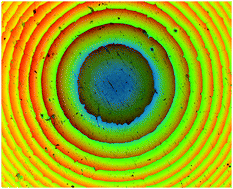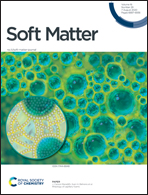Strain-enhanced sensitivity of polymeric sensors templated from cholesteric liquid crystals†
Abstract
Detection of volatile organic compounds (VOCs) is an important issue due to their harmful impact on human health. In this study, we aimed at enhancing the sensitivity of the anisotropic polymeric films templated from cholesteric liquid crystals (CLCs) in the identification of VOCs at concentrations on the order of 100 ppm. To increase sensitivity, we introduced negative strain to the films in the direction parallel to the helical axis and evaluated its effect on the sensitivity. Specifically, we used LC mixtures of reactive [4-(3-acryloyoxypropyloxy)benzoic acid 2-methyl-1,4-phenylene ester (RM257)], nonreactive E7 mesogen and chiral dopant [4-((1-methylheptyloxycarbonyl)phenyl-4-hexyloxybenzoate) (S-811)] to synthesize CLC-templated polymeric films with programmed strain profiles using a curved wedge cell, and measured their response against a range of toluene vapor concentrations. Based on the obtained results, we demonstrated a relationship between the negative strain in the cholesteric pitch and the sensitivity of the sensor based on spacial responses evaluated from the change in coloring of the film. Our results showed that negative strain helps to increase the sensitivity of the sensors up to 15 times compared to their unstrained counterparts. Moreover, 90% of the equilibrium response is achieved in less than one minute of exposure which offers rapid diagnosis of VOCs. Our tests for the reversibility of the sensors showed that the CLC-templated polymeric films can be used multiple times without a significant loss of sensitivity.



 Please wait while we load your content...
Please wait while we load your content...